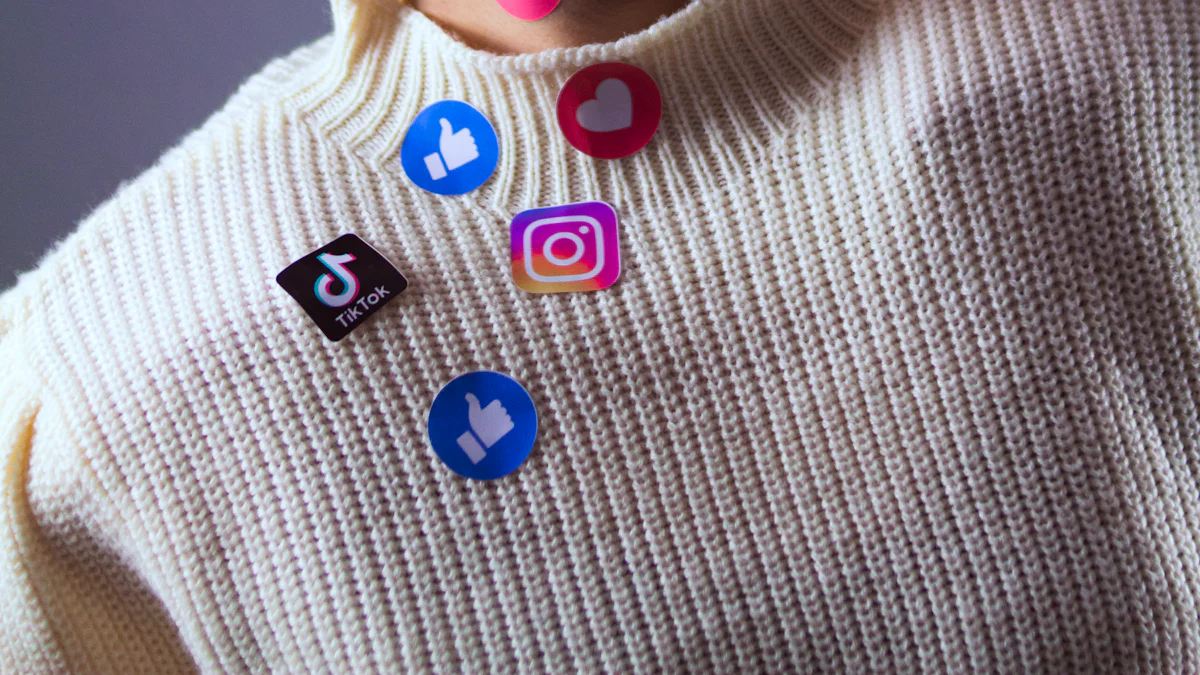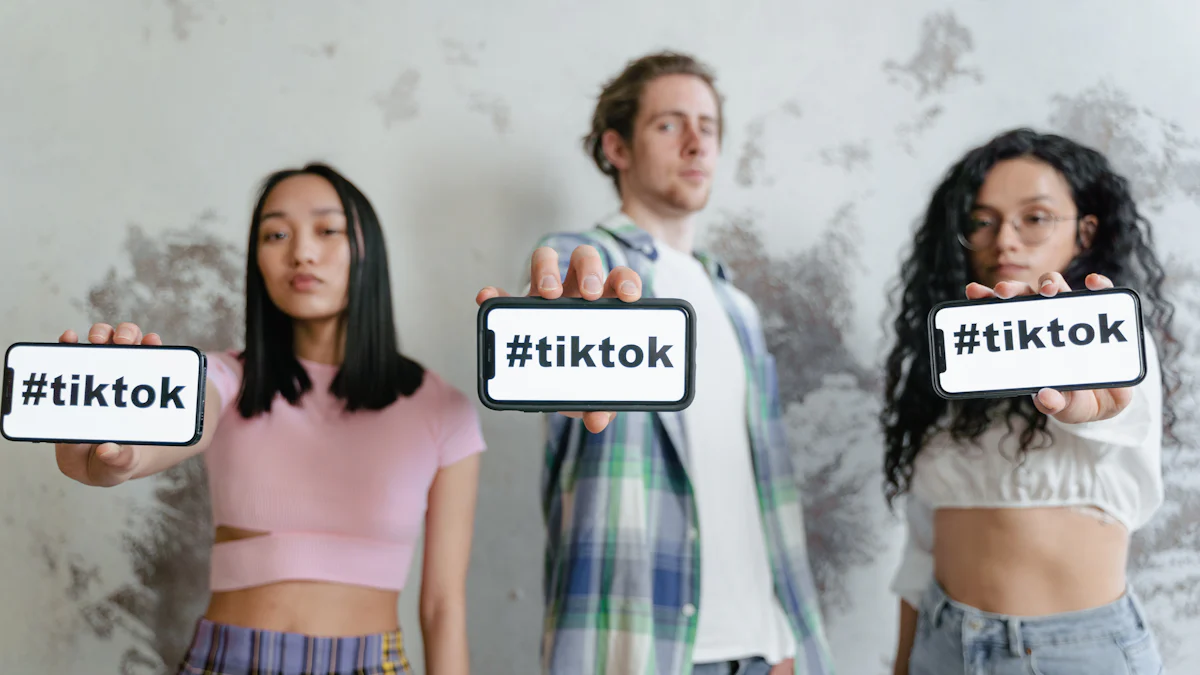What Social Media Influencers Mean for Youth Identity in 2025

Have you noticed how much social media influencers impact on youth and shape the way you express yourself? In 2025, social media is more than just a tool for sharing photos or videos. It’s become a space where you can explore your identity, connect with others, and even discover your passions. Social media influencers play a huge role in this transformation. Their relatable content inspires creativity, fosters a sense of belonging, and helps you feel part of a community. However, let’s be real—there’s also pressure. Trying to keep up with the perfect online personas of influencers can feel overwhelming. Still, these platforms, influenced heavily by social media influencers' impact on youth, offer safe spaces, especially for marginalized groups like LGBTQ+ youth or those facing mental health challenges. They’re reshaping how you see yourself and the world around you.
Youth Identity and Culture in 2025
Defining Youth Identity in the Digital Era
The role of social media in self-expression
Social media has become your go-to space for self-expression. It’s where you share your thoughts, showcase your talents, and connect with others who share your interests. Platforms like TikTok and Instagram let you experiment with different aspects of your identity. You can try out new looks, explore hobbies, or even join conversations about important issues. Experts say that your identity is shaped by how you present yourself online and how you interact with your audience. This constant performance helps you figure out who you are and what you stand for.
Global connectivity and its influence on identity
The digital world connects you to people from all over the globe. This global connectivity exposes you to diverse cultures, ideas, and lifestyles. It’s easier than ever to find communities that align with your values or interests. But this merging of different contexts—like school, family, and online spaces—can make identity feel more complex. You’re not just influenced by your immediate surroundings anymore. Instead, you’re part of a dynamic, ever-changing global culture.
Gen Z Trends Shaping Youth Culture
The rise of digital-first lifestyles
As a member of Gen Z, you probably can’t imagine life without your phone. Mobile devices are your main tool for staying connected, consuming media, and even shopping. Gen Z trends show that you prefer digital-first lifestyles. Social media isn’t just entertainment; it’s where you discover new products, learn about the latest trends, and even make decisions about what to buy.
Inclusivity and diversity as cultural cornerstones
Inclusivity and diversity are at the heart of Gen Z culture. You value authenticity and want to see people from all backgrounds represented in media and advertising. Social media has amplified this demand for representation. You’re drawn to influencers and brands that celebrate differences and promote equality. This focus on inclusivity is shaping the way you and your peers view the world.
Challenges in Navigating Identity
Balancing online and offline personas
It’s not always easy to balance your online and offline selves. On social media, you might feel pressure to present a polished version of yourself. But in real life, you’re more than just your posts and photos. Finding harmony between these two worlds can be tricky. You want to stay authentic while also fitting into the digital spaces you care about.
The impact of comparison culture on self-esteem
Scrolling through social media can sometimes leave you feeling less than great. Seeing influencers or even your peers living seemingly perfect lives can make you question your own. This comparison culture can take a toll on your self-esteem. It’s important to remember that what you see online is often curated and doesn’t tell the whole story.
Social Media Influencers' Impact on Youth

Driving Gen Z Trends and Norms
Fashion, beauty, and lifestyle trends
You’ve probably noticed how social media influencers set the tone for what’s cool. From the latest fashion must-haves to beauty hacks, they’re the ones driving trends that you and your friends follow. Creators like Charli D’Amelio and Addison Rae make it easy to trust their recommendations because they feel relatable. Whether it’s a skincare routine or a new clothing brand, their influence shapes what you see as stylish. Nearly 40% of Gen Z now trust influencers more than ever, showing how much their opinions matter.
Amplifying niche interests and subcultures
Social media isn’t just about mainstream trends. Influencers also help you explore niche interests and subcultures. For example, Tyler Oakley creates a safe space for LGBTQ+ youth, while Nabela Noor challenges beauty norms with her body positivity content. These creators make you feel seen and understood, especially if you don’t fit into traditional molds. They show you that it’s okay to embrace your unique identity and find a community that shares your passions.
Shaping Values and Beliefs
Advocacy for social and environmental causes
Influencers don’t just entertain—they inspire action. Many advocate for causes that matter to you, like climate change or mental health awareness. For instance, Leonardo DiCaprio uses his platform to promote conservation, while Cristina (mitty) fights for ocean preservation. These creators encourage you to think about the world beyond your screen and take part in meaningful change.
Challenging traditional societal norms
You’ve probably seen influencers push boundaries and question outdated norms. They promote inclusivity, diversity, and acceptance. Whether it’s Bretman Rock breaking stereotypes in beauty or Lilly Singh empowering young women, these creators challenge you to rethink what’s possible. They’re not just shaping trends—they’re reshaping how you view the world.
Influencing Aspirations and Behaviors
Career paths inspired by influencers
Have you ever thought about becoming a content creator? Many Gen Z members see influencers as role models for unconventional career paths. Platforms like TikTok and Instagram make it easier than ever to turn your hobbies into a profession. Influencers show you that success doesn’t have to follow a traditional route.
Shaping consumer habits and brand loyalty
When it comes to shopping, influencers play a huge role in your decisions. You’re twice as likely to trust their recommendations compared to traditional ads. Micro-influencers, in particular, feel more authentic and relatable, making their endorsements even more impactful. Whether it’s a new gadget or a sustainable brand, their opinions guide your choices and build your loyalty to certain products.
Platforms and Strategies Influencers Use

Social Media Platforms Dominating 2025
TikTok, Instagram, and emerging immersive platforms
You’ve probably noticed how TikTok and Instagram continue to dominate social media platforms in 2025. These platforms thrive because they focus on short-form videos, which are perfect for your fast-paced lifestyle. Experts like Alexandra Nicolae say that authentic, raw content drives what you watch and trust. Livestreams and behind-the-scenes clips are especially popular because they feel real and unfiltered. Vertical videos, as Diya Banerjee points out, are now the go-to format for storytelling. They’re easy to consume and share, making them a favorite for Gen Z.
Emerging immersive platforms are also gaining traction. These platforms combine entertainment with interaction, giving you a more engaging experience. Whether it’s exploring a virtual world or connecting with influencers in real-time, they’re changing how you interact with content.
The role of AR/VR in creating engaging experiences
Augmented reality (AR) and virtual reality (VR) are game-changers. They let you do things like virtually try on clothes or take a guided tour of a dream destination. Over 61% of people prefer AR over traditional methods because it’s interactive and fun. Travel influencers, for example, can take you on virtual adventures, while brands use gamified experiences to keep you engaged. These technologies make you feel like an active participant, not just a viewer.
Content Strategies That Resonate with Gen Z
Authenticity and relatability as key drivers
You value authenticity more than anything. Influencers who share their real lives, struggles, and successes feel relatable. Companies know this and often collaborate with influencers who align with your values. Authentic influencer partnerships help brands connect with you on a deeper level. You’re more likely to trust someone who seems genuine, especially when they’re transparent about their experiences.
Storytelling and user-generated content for connection
Storytelling is another powerful tool. You’re drawn to brands and influencers with a strong purpose or story. McKinsey highlights how Gen Z prefers brands committed to green practices or social causes. User-generated content (UGC) plays a big role here. When you see real people sharing their experiences, it feels more authentic. Platforms like Airbnb use host stories to make their content relatable. UGC fosters a sense of community, making you feel like you’re part of something bigger.
Leveraging Technology for Greater Influence
AI-driven personalization and content creation
Artificial intelligence (AI) is everywhere. Influencers use it to create personalized content that speaks directly to you. AI-driven campaigns target specific niches, making them more effective. For example, AI influencers can represent diverse communities, ensuring everyone feels included. They also help brands optimize their strategies in real time, so you get content that’s always fresh and relevant.
Data analytics for targeted audience engagement
Data analytics is another secret weapon. Influencers analyze your preferences, engagement rates, and even sentiment to tailor their content. Predictive analytics helps them stay ahead of trends, ensuring they deliver what you want before you even know you want it. This data-driven approach makes their content more engaging and keeps you coming back for more.
Implications of Influencer Culture on Youth
Positive Impacts of Social Media Influencers
Encouraging creativity and self-expression
Social media influencers inspire you to explore your creative side and express yourself in unique ways. Influencers like Jay Shetty motivate you to embrace personal growth and develop a positive mindset. They share their own experiences and insights, encouraging you to unlock your potential. Creators like Vsauce spark curiosity by diving into fascinating topics like science and philosophy. Their content makes you want to learn more and explore new ideas.
Some influencers also celebrate individuality and inclusivity. Tyler Oakley and Lilly Singh, for example, create spaces where you feel empowered to embrace your identity. They remind you that your voice matters and that you can achieve your dreams.
Building virtual communities and shared experiences
Influencers help you feel connected, even in a digital world. They foster community building by creating spaces where you can engage with others who share your interests. These creators often share their personal stories, whether it’s about mental health, LGBTQ+ identity, or overcoming challenges. By being authentic, they make you feel like you belong.
They also expand your social horizons. Through their platforms, you can connect with people from different backgrounds and cultures. This sense of belonging helps you feel less alone and more understood.
Negative Impacts on Gen Z
Unrealistic standards and materialism
While influencers can inspire, they can also set unrealistic expectations. Many edit their photos or curate their lives to look perfect. This can make you feel like you’re not enough. Some influencers promote materialism by constantly showcasing luxury items or expensive lifestyles. It’s easy to feel pressured to keep up, even if it’s not realistic.
Mental health challenges from constant exposure
Spending too much time online can take a toll on your mental health. Constantly comparing yourself to influencers or peers can lead to feelings of inadequacy. You might start questioning your worth based on likes or comments. It’s important to remember that what you see online isn’t always real.
Promoting Balance and Awareness
The importance of digital literacy and critical thinking
To navigate the digital world, you need strong digital literacy skills. Learn to question what you see online. For example, some influencers promote products just for financial gain, not because they genuinely believe in them. Be skeptical of overly polished content or excessive advertising. By thinking critically, you can separate authentic content from what’s just marketing.
Advocating for diverse and inclusive representation
Diverse representation matters. Influencers and brands should collaborate with creators from all backgrounds to ensure everyone feels seen. Authenticity is key—representation should go beyond words and be backed by action. When influencers promote inclusivity, they help create a world where everyone feels valued.
Social media influencers play a huge role in shaping how you see yourself and the world in 2025. They’ve become more than just trendsetters—they’re relatable figures who help you explore your identity and connect with others. For many, especially marginalized groups like LGBTQIA+ youth, influencers offer a sense of belonging and validation. You see their real stories and feel inspired to embrace your own.
But it’s not all perfect. The pressure to meet unrealistic standards can affect your mental health. Constant exposure to curated lives might make you question your own worth. That’s why it’s so important to think critically about what you see online. As a member of gen z, you have the power to demand inclusivity and authenticity. By staying aware, you can enjoy the creativity and community influencers bring while protecting your well-being.
FAQ
What makes social media influencers so popular with Gen Z?
You connect with influencers because they feel relatable and authentic. They share their real lives, struggles, and successes, which makes them more trustworthy than traditional celebrities. Plus, they create content that aligns with your interests and values, making it easy to engage with them.
How do influencers impact your mental health?
Influencers can inspire you, but they might also set unrealistic standards. Constantly comparing yourself to their curated lives can hurt your self-esteem. It’s important to remember that what you see online isn’t always real and to take breaks when needed.
Can influencers help you discover your identity?
Absolutely! Influencers often share personal stories and celebrate individuality. They encourage you to explore your passions, embrace your uniqueness, and connect with like-minded communities. Their content can help you feel seen and understood, especially if you’re navigating complex aspects of your identity.
How can you avoid falling into comparison culture?
Focus on your own journey. Limit your screen time and follow influencers who promote positivity and authenticity. Practice gratitude for what you have and remind yourself that social media often shows only the highlights of someone’s life.
Are influencers trustworthy when promoting products?
Not always. Some promote products for financial gain, not because they believe in them. Look for transparency, like when influencers disclose paid partnerships. Do your own research before making decisions based on their recommendations.
💡 Tip: Follow influencers who align with your values and prioritize honesty in their content.
See Also
Essential Influencer Marketing Platforms for 2024 Success
Key Influencer Marketing Trends to Monitor This Year
Effective TikTok Influencer Marketing Tactics for 2024
